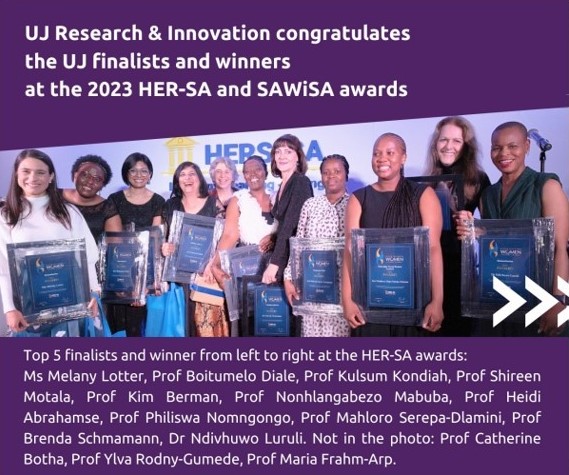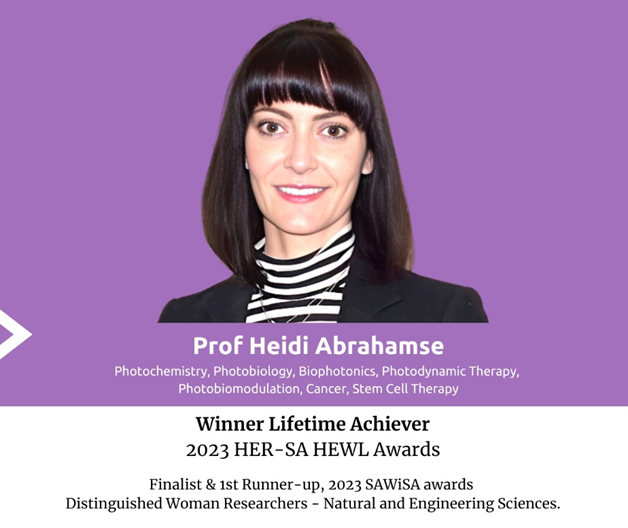UJ Women Researchers Celebrated and Honored at HER-SA HEWL and SAWiSA Awards
UJ Research and Innovation congratulates the UJ finalists and winners at the 2023 HER-SA HEWL and SAWiSA awards on Thursday 7 and Friday 8 September 2023.

The Higher Education Resource Services – South Africa, Higher Education Women Leaders (HER-SA HEWL) awards recognise the achievements of women who inspire, motivate and lead others to achieve their best, and who attract new leadership talent to the sector.
The Department of Science and Innovation (DSI) 2023 South African Women in Science Awards (SAWiSA) recognise and reward excellence by women scientists and researchers, and profile them as role models for younger women.
Lifetime Achiever
 On Thursday 7 September, Prof Heidi Abrahamse won the Lifetime Achiever category at the HER-SA HEWL awards. The next day, she was named first runner-up at the 2023 SAWiSA awards in the Distinguished Woman Researchers – Natural and Engineering Sciences category.
On Thursday 7 September, Prof Heidi Abrahamse won the Lifetime Achiever category at the HER-SA HEWL awards. The next day, she was named first runner-up at the 2023 SAWiSA awards in the Distinguished Woman Researchers – Natural and Engineering Sciences category.
Abrahamse is the Director of the Laser Research Centre (LRC) within the UJ Faculty of Health Sciences. She and her team focus on Photodynamic therapy aimed at the treatment of cancer and Photobiomodulation for regenerative medicine.
In Photodynamic therapy, they develop multicomponent photochemotherapeutic drugs. The other major technique they research is Photobiomodulation. There they use laser irradiation to enhance adipose-derived (fat) stem cell differentiation into several other cell types such as bone, smooth muscle and nerve cells.
Photodynamic therapy and Photobiomodulation have far fewer side effects than conventional or standard practice treatments. These techniques can be used as a treatment modality but also as a diagnostic tool and as a preventative measure.
Prof Abrahamse has graduated 27 doctorates and 57 masters’ students. At the LRC, 69% of the researchers are women.
Doctoral Fellowship
 On Friday 9 September, Ms Betty Sebati received a DSI-Ndoni Mcunu Fellowship: Doctoral Awards at the SAWiSA awards. Sebati is completing her doctoral studies at the SAMRC/UJ PACER.
On Friday 9 September, Ms Betty Sebati received a DSI-Ndoni Mcunu Fellowship: Doctoral Awards at the SAWiSA awards. Sebati is completing her doctoral studies at the SAMRC/UJ PACER.
The South African Medical Research Council/University of Johannesburg (SAMRC/UJ) Pan African Centre for Epidemics Research (PACER) Extramural Unit focuses on improving the understanding of current pandemics through cutting-edge Pan African and global research.
Ms. Sebati’s doctoral study focuses on one group within “key populations’’ in South Africa.
These populations are characterised by having an increased risk of HIV acquisition and transmission. The study contributes to the reduction in the inequalities and discrimination towards key populations who are not prioritized in the HIV responses and are facing stigma and discrimination due to their sexual orientations and behaviours.

